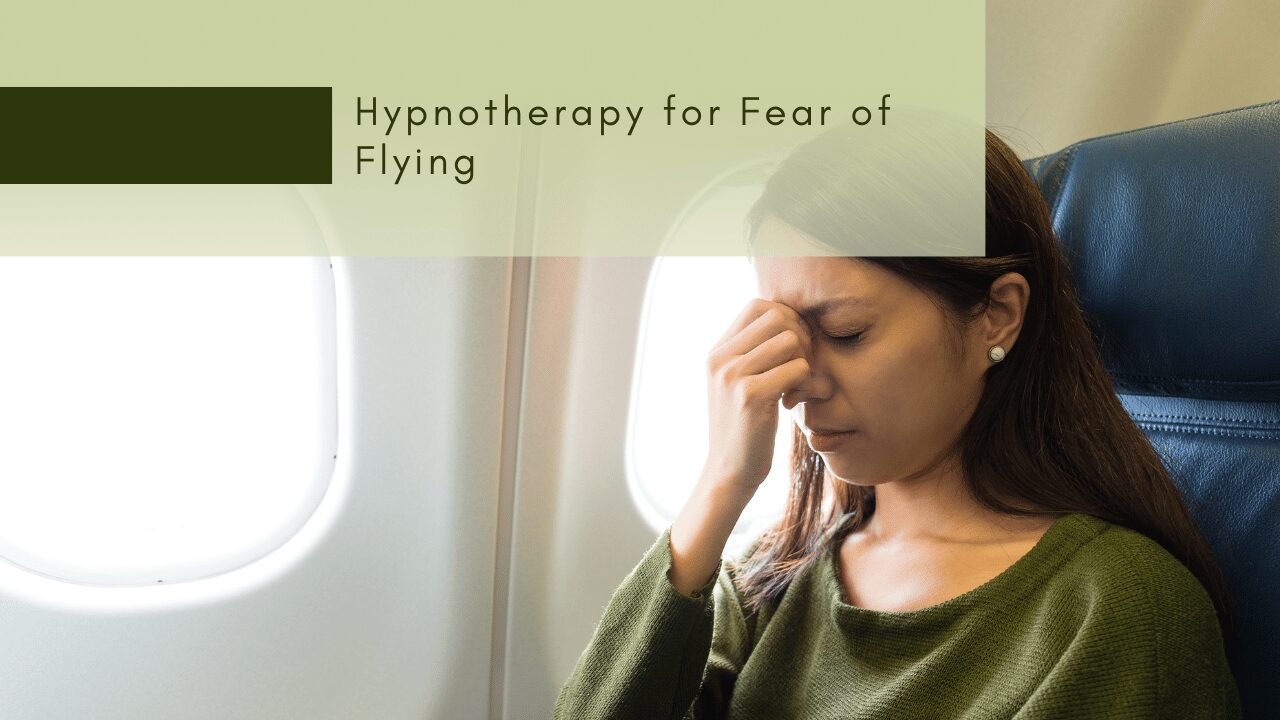In this piece, we’ll delve into hypnotherapy for fear of flying, exploring the nature of this phobia, its origins, and the role hypnotherapy can play in its treatment.
Fear of Flying or Aviophobia
The fear of flying, also known as aviophobia, is a relatively common phobia that can have various underlying causes. Here are some factors that contribute to the fear of flying:
Control Issues
Some individuals experience anxiety when they are not in control of a situation. Flying involves surrendering control to the pilot and the aircraft, which can be unsettling for those who prefer to be in control.
Fear of Heights (Acrophobia)
The fear of flying may be linked to a broader fear of heights. Being at a high altitude during a flight can trigger anxiety and discomfort for individuals with acrophobia.
Claustrophobia
The enclosed space of an aircraft, particularly in smaller airplanes, can trigger claustrophobic reactions in some individuals. The feeling of being confined in a limited space at high altitudes can be distressing.
Fear of Crashing
The fear of a plane crash is a common concern for those with aviophobia. Despite statistically being one of the safest modes of transportation, the fear is often fueled by media coverage of aviation incidents.
Past Traumatic Experiences
Individuals who have experienced a traumatic event related to flying or have witnessed a plane crash may develop a fear of flying. Traumatic experiences can have a lasting impact on one’s perception of air travel.
Fear of the Unknown
For some, fear of flying is linked to the unfamiliarity of the flying experience. Lack of knowledge about aviation, how airplanes work, and what to expect during a flight can contribute to anxiety.
Anxiety or Panic Disorders
Individuals with pre-existing anxiety or panic disorders may find that the stressors associated with flying exacerbate their symptoms, leading to a fear of flying.
Negative Media Influence
Extensive media coverage of aviation accidents can contribute to the fear of flying by creating a perception that flying is riskier than it actually is.
The prevalence of the fear of flying varies among individuals and populations. Estimates suggest that around 2.5-6.5% of the global population experiences a fear of flying. It can range from mild uneasiness to severe anxiety or panic attacks. The fear may lead some individuals to avoid air travel altogether, impacting both personal and professional aspects of their lives.
How Can Hypnotherapy Assist in Addressing Flying Phobia?
Hypnotherapy can be a valuable tool in addressing flying phobia by targeting the subconscious mind and working to reframe negative thought patterns and associations related to flying. Here are ways in which hypnotherapy can assist individuals in overcoming their fear of flying:
Relaxation Techniques
Hypnotherapy often involves inducing a deep state of relaxation. This can help individuals manage anxiety associated with flying by promoting overall relaxation and reducing the physiological responses to stress.
Identifying Root Causes
Hypnotherapy can help individuals explore and identify the root causes of their fear of flying. This may involve uncovering past experiences, traumas, or subconscious beliefs that contribute to the phobia.
Addressing Negative Thought Patterns
Hypnotherapy can be used to challenge and reframe negative thought patterns associated with flying. Individuals can work with the hypnotherapist to replace irrational fears with more rational and positive thoughts.
Creating Positive Associations
Through hypnotic suggestion, individuals can create positive associations with the flying experience. This might involve visualising a calm and enjoyable flight, focusing on positive aspects of air travel, and reinforcing a sense of safety.
Desensitisation
Hypnotherapy can incorporate gradual desensitisation techniques, allowing individuals to become more comfortable with the idea of flying. This may involve guided imagery, progressively introducing elements of flying in a controlled and relaxed setting.
Building Confidence
Hypnotherapy sessions can be tailored to boost confidence and self-efficacy related to flying. This can involve suggestions that enhance feelings of competence and control during the flying experience.
Anxiety Reduction
Hypnotherapy is known for its ability to reduce anxiety. By addressing the underlying anxiety associated with flying, individuals can learn to manage their fear responses and approach air travel with a greater sense of calm.
Visualisations and Imagery
Guided visualisations and imagery exercises during hypnotherapy can help individuals mentally rehearse successful and anxiety-free flights. This process can create a positive mental blueprint for future flying experiences.
Coping Strategies
Hypnotherapy can equip individuals with effective coping strategies to manage anxiety during a flight. These strategies may include deep breathing, visualization, and other relaxation techniques that can be employed in real-time.
Reinforcement of Positive Beliefs
Hypnotherapy sessions can reinforce positive beliefs and affirmations related to flying. This ongoing reinforcement helps to counteract negative thought patterns and build a more positive mindset.
What Are the Key Components of Hypnotherapy Techniques for Aviophobia?
The key components of hypnotherapy for aviophobia may include:
Relaxation Induction
The hypnotherapist guides the individual into a deeply relaxed state. This induction phase is crucial for creating a calm and receptive mental state, making it easier to address the underlying fears and anxieties.
Positive Visualisation
During the hypnotic state, the individual is guided through positive visualisations related to flying. This may include imagining a safe and pleasant flight, feeling calm and in control during the journey, and visualizing positive outcomes.
Desensitisation Techniques
Gradual desensitisation is often employed to help individuals become accustomed to the idea of flying. The hypnotherapist may guide the person through increasingly detailed and realistic scenarios involving air travel, all while maintaining a relaxed state.
Addressing Negative Thought Patterns
Hypnotherapy aims to identify and challenge negative thought patterns associated with flying. This may involve exploring and reframing irrational beliefs, such as catastrophic thinking or exaggerated fears about the safety of flying.
Root Cause Exploration
The hypnotherapist may guide the individual to explore and understand the root causes of their fear of flying. This can involve uncovering past experiences, traumas, or subconscious beliefs that contribute to the phobia.
Suggestion Therapy
Hypnotherapy often includes suggestion therapy, where the hypnotherapist provides positive and empowering suggestions to the subconscious mind. These suggestions may include statements that reinforce a sense of calm, safety, and confidence during air travel.
Anxiety Reduction Techniques
Techniques for reducing anxiety are integrated into hypnotherapy sessions. This may involve suggestions for deep breathing, progressive muscle relaxation, or other relaxation techniques that individuals can use during moments of anxiety.
Cognitive Restructuring
Cognitive restructuring involves identifying and challenging negative thought patterns related to flying and replacing them with more rational and positive thoughts. This process helps reshape the individual’s perception of air travel.
Self-Efficacy Building
Hypnotherapy aims to enhance the individual’s self-efficacy and belief in their ability to cope with and overcome the fear of flying. Positive affirmations and suggestions are used to boost confidence in handling the challenges associated with air travel.
Rehearsal of Coping Strategies
Individuals are guided through mental rehearsals of effective coping strategies that can be used during a flight. This helps build a sense of preparedness and control over anxious feelings.
Can Hypnotherapy Provide Long-term Results Against Fear of Flying?
Hypnotherapy has the potential to provide long-term results against the fear of flying (aviophobia), but the effectiveness of the treatment can vary among individuals. Whether hypnotherapy leads to lasting results often depends on factors such as the individual’s level of commitment, the severity of the fear, and the presence of any underlying psychological issues.
What Are Some Real-life Success Stories of Overcoming Fear of Flying with Hypnotherapy?
While specific and detailed real-life success stories may not be readily available due to the personal and private nature of therapeutic experiences, there are anecdotal accounts and testimonials suggesting that hypnotherapy has helped some individuals overcome their fear of flying. Keep in mind that individual experiences can vary, and what works for one person may not work for another. Here are some generalized examples based on the potential benefits of hypnotherapy:
Gradual Exposure Success
Some individuals have reported success with hypnotherapy by gradually exposing themselves to the idea of flying. Through guided visualizations and relaxation techniques during hypnotherapy sessions, they were able to desensitize themselves to the fear and build confidence in small steps.
Cognitive Restructuring
Hypnotherapy often incorporates cognitive restructuring to challenge negative thought patterns. Individuals who have successfully overcome their fear of flying through hypnotherapy may have experienced a shift in their beliefs about the safety of air travel, leading to reduced anxiety.
Increased Relaxation and Calmness
Success stories often highlight the role of hypnotherapy in promoting relaxation and calmness during flights. Individuals may describe feeling more at ease, both mentally and physically, which contributes to a more positive flying experience.
Changed Perceptions of Control
Hypnotherapy can address issues related to control and help individuals feel more comfortable surrendering control during a flight. Success stories may involve a shift in perception, where individuals no longer view lack of control as a significant source of anxiety.
Positive Behavioral Changes
Some individuals report adopting new, positive behaviors related to flying after undergoing hypnotherapy. This could include using relaxation techniques, coping strategies, and mental rehearsal, all of which contribute to a more positive and comfortable flying experience.
It’s important to approach success stories with the understanding that individual experiences are subjective, and what works for one person may not work for another. Additionally, the success of hypnotherapy may be influenced by various factors, including the skill of the hypnotherapist, the severity of the fear, and the individual’s commitment to the therapeutic process.




